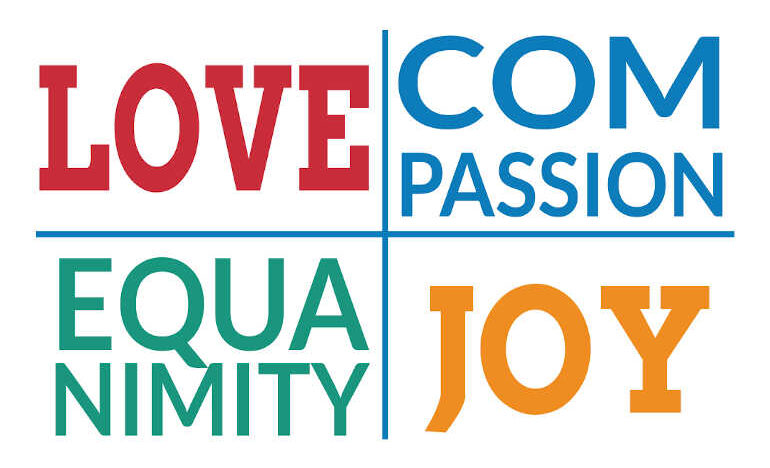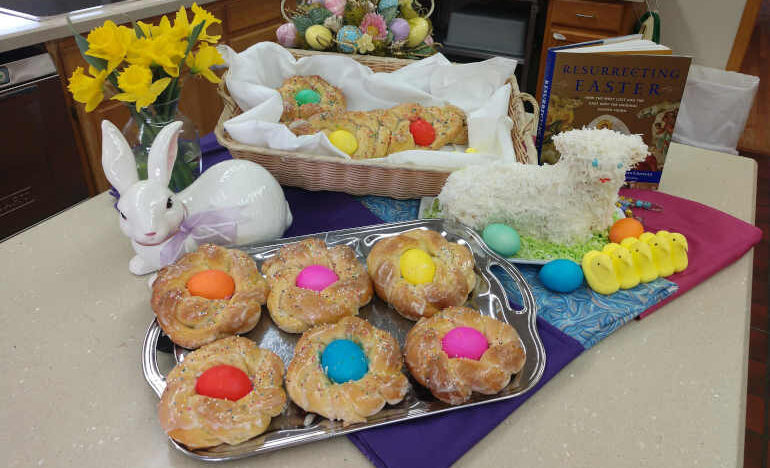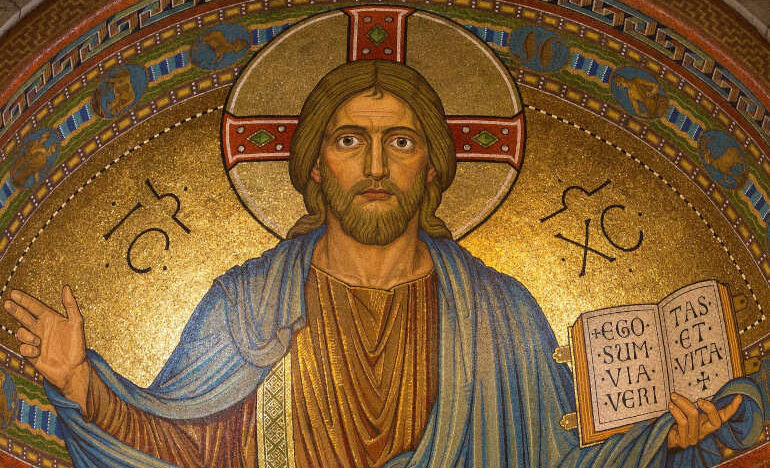The Four Divine Abodes: Love, Compassion, Joy, Equanimity

By Kathy Keary
Part 9. Read all the parts of the Jesus and Buddha series here.
As we continue our exploration of Christianity and Buddhism, let us pause and consider for a moment the value of taking this journey. In studying the life and teachings of Jesus and the Buddha, we unearth what it means to be a contemplative in the world. A study of diverse faiths not only leads to a greater love for our own faith but also strengthens our commitment to strive for peace and understanding among all people including those who hold beliefs different from our own.
In comparing these two historical figures, we are not elevating Buddha to the level of God as we do with Jesus. It should be noted that Buddhist do not consider the Buddha a god either. He is a prophetic voice that lived long before Jesus and mapped out a wholesome, loving way of being in the world. People of varying faiths, including many Christians, are inspired by his teachings and adopt some of his practices while engaged in their own religion. Quite similarly, many people of diverse faiths admire Jesus, his teaching, and his contemplative lifestyle.
Note: Never miss an article published on the Renewal Center website: Sign up to receive our newsletters
The Buddha instructed his followers to cultivate four states of mind known as Brahma-viharas, which are also known as Four Divine Abodes, Four Divine States of Dwelling, Four Immeasurables, or Four Perfect Virtues. These states are metta (loving-kindness), karuna (compassion), mudita (appreciative joy), and upekkha (equanimity).
In her article, “Brahma-Vihara: The Four Divine States or Four Immeasurable,” Barbara O’Brien instructs that these states are not emotions nor is it possible to merely decide that you are going to exhibit these attributes. O’Brien asserts: “Truly dwelling in these four states requires changing how you experience and perceive yourself and others. Loosening the bonds of self-reference and ego is especially important.”
As I reflect on O’Brien’s comment, the words of Jesus come to mind, “For whoever wants to save his life will lose it, but whoever loses his life for my sake will save it” (Mt10:39). Emptying one’s self of ego is a common theme in the writings of Christian spiritual masters such as Thomas Merton, Henri Nouwen, James Finley, and Richard Rohr.
New articles in this series are posted to the website every Monday. The full series can be found here: An Invitation to Something New: The Contemplative Life. On Thursday’s we’ll send an email to remind you of the articles.
The act of self-emptying is also a theme during Lent as we strive to emulate Jesus who “emptied himself taking the form of a slave, coming in human likeness; and found human in appearance, he humbled himself, becoming obedient to death, even death on a cross” (Philippians 2: 7-8).
The article, “Brahma Viharas,” describes the Four Divine Abodes as qualities of love that are said to be “sublime, lofty, noble, and most excellent for they are the right and ideal way of relating with all living beings.” The author elaborates:
These sublime qualities of love provide the answer to all situations we may encounter in our lives. They are the great removers of tension, the great peace-makers in social conflict, and the great healers of wounds suffered in the struggle of existence. These noble qualities of love level social barriers, build harmonious communities, awaken the slumbering generosity within us, and revive the joy and hope long abandoned.
These four states have the potential to purify the heart and create positive energy. As this loving attribute grows so does the propensity to share that love with others. Undesirable qualities such as delusion, greed, self-centeredness, and negativity are transformed. States of anger, hatred, loneliness, sorrow, and unhealthy attachments are healed. Noble hearts full of wisdom, compassion, and love blossom.
The article, “One Mind Dharma,” categorizes the Four Divine Abodes as heart practices cultivated not only through meditation but also in mindfulness and concentration practices. Nurturing these heart practice leads to a calm, joyous mind. The Buddha emphasized these states as a path to awakening.
I refer you to our article, “Fruits of Contemplation” written from a Christian perspective and outlines the treasures derived from the practice of centering prayer, non-discursive meditation where one rests in the divine embrace. The article, Out of Contemplation Grows Action, speaks of action that springs from Christian spiritual practices.
Both the Christian and Buddhist traditions agree that our spiritual practices are meant to cultivate a transformation of heart that propels us into the world to extend love and compassion to all people without exception. As St. James proclaimed: “Faith without works is dead” (James 2:26).
Stay tuned for our upcoming articles where we will delve into each of the Four Divine Abodes, loving-kindness, compassion, appreciative joy, and equanimity from a Buddhist and Christian viewpoint.
Reference
O’Brien, Barbara. “Brahma-Vihara: The Found Divine States of Four Immeasurables.” Learn Religions, April 16, 2019.
“The Brahma Viharas.” Four Immeasurable, 2021.
“The Four Brahma Viharas.” One Mind Dharma.
[Kathy Keary, a Precious Blood Companion and spiritual director, holds a master’s degree in theological studies and is a graduate of the Atchison Benedictine’s Sophia Center’s Souljourners Program, an intense study of spirituality and spiritual direction. Kathy believes that the divine is present and active in all of life and encourages others to be awakened to the God in all including the divine within. She enjoys accompanying others on their journey to wholeness discovering the person they were created to be.]
We’d Like to Hear From You!
We’d like to know what you think about this article. Send us a comment using the form below. Do you have a suggestion? Is there something you want to learn more about? Send us a note.
Related

Easter Bread (Pane di Pasqua)
By Lucia Ferrara
Easter bread is a fun bread. It’s a fun bread to make with your children, with your family, with neighbors and friends. The tradition of Easter bread dates back centuries and comes from many parts of the world.

Easter Sunday, the Resurrection of the Lord
Today’s scriptures tell us how three days changed the world. How have they changed you?
Categories
Assembling God's Puzzle Coffee with Padre Cooking & Spirituality Encounters of the 4th Kind Family Matters Reflections on the Eucharsitic Prayers Spiritual Resources Taize Prayers The Contemplative Life Traveling with Pilgrims of Hope Uncategorized Videos Week of Prayer for Uhristian Unity When you need a little help
